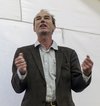
‘Le monde est trop plein,’ Claude Lévi-Strauss said on his 100th birthday, referring to the relentless pace of humanly induced change. It is no coincidence that some of the most fashionable words in the human sciences in the last few years have been neoliberalism, the precariat and the Anthropocene. Modernity has shifted to a faster gear only since around 1990, and the implications of the new, superhuman speed of change are still not well understood. The study of speed, growth and the contradictions they entail should be the main priority for the human sciences today.
Modernity entails change by definition, but for many years change was assumed to be synonymous with progress, and the standard narrative about the recent past was one of improvement and development. Things seemed to be getting better, and history had a direction.
In the last few decades, the confidence of the development enthusiasts has been dampened. The forces of progress turned out to be a double-edged sword. War, oppression, inequality and poverty were never eradicated, crucial resources are becoming scarce, financial crises recur in unpredictable and dramatic ways, and most importantly, what had been our salvation for two hundred years, namely inexpensive and accessible energy, is now quickly becoming our damnation through environmental destruction and climate change. Indeed, it is chiefly in this sense that it is meaningful to talk of our time as being postmodern.
How can we come to grips with the speed of change? Can or should we slow down? Is the planet a patient with a fever or a high blood pressure? Probably both. But at the outset, what matters is to understand the implications of accelerated change, in order to come to terms with the world in which we now live.
Thomas Hylland Eriksen er professor i antropologi ved Universitet i Oslo, hvor han i mange år har studeret og skrevet om identitet, politik, etnicitet, nationalisme og globalisering fra et komparativt perspektiv. Han er også en ivrig samfundsdebatør, der blandt andet har udgivet polemiske bøger om Norges kulturelle kompleksitet.